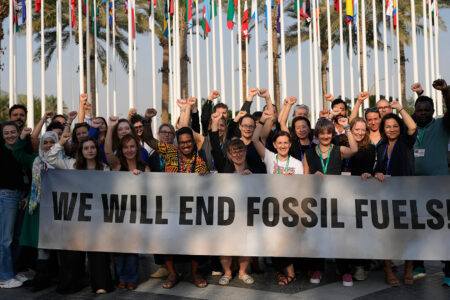
The recent collapse of oil markets is good news for those filling up at the local station, but not for oil producers or for the climate.
The unravelling of the production agreement between the Organization of Petroleum Exporting Countries (OPEC) and Russia to sustain prices has given way to a war over market share, triggered by rapidly falling global demand during the COVID-19 crisis. Both the Saudis and the Russians now stand ready to take hundreds of billions of dollars of revenue losses, effectively subsidizing fossil fuel consumption. Canada and the US are likely to follow suit with bailouts for their industries, though US President Trump has faced widespread opposition to the idea.
The current crisis presents an opportunity to push for an international agreement on oil, gas and coal production management that also works toward the objectives of the Paris Agreement on Climate Change. This may sound difficult to achieve, but it is likely the best way to bring energy markets in line with climate imperatives while addressing the interests of producing countries and consumers.
Recessions and emissions
Some environmental activists see the current global economic slowdown as putting a dent in greenhouse gas emissions. Yet economic recession is not a long-term answer to greenhouse gas management — as demonstrated by the rapid rebound following the last global economic crisis.
From a climate perspective the biggest issue is not the temporary decrease in emissions from depressed economic activity, but rather a mix of bailouts and cheap oil that will keep fossil fuel companies afloat and slow down investments in green energy and electric cars.
Too much money is being lost from the current price war and COVID-19 recession not to find a resolution, but it should be more than a return to the unstable agreements on market-share division seen between OPEC and Russia.
Fossil fuels and the Paris Agreement
For the last few years, a small group of policy advocates and academics has been promoting a fossil fuel production management agreement. In contrast to the Paris Agreement, which focuses on decreasing the use of fossil fuels, this agreement would limit how much is taken out of the ground. Despite its fundamental importance, the concept has never received much international attention, compared with the focus on reducing consumption.
Without such an agreement, individual actions by producers have limited effect. Cutting coal production in Germany or capping future emissions in the Canadian oil sands makes little difference to global fossil fuel emissions when there is already excess supply. In the framework of a global agreement, however, such actions could be leveraged to have real impact. To help, tools within the agreement can include restrictions on investments in exploration, caps on production levels and the trading of reductions in production.
Few governments are willing to unilaterally restrict their production of oil, gas and coal for environmental reasons alone. Yet oil producers have much to gain from stability in markets and higher prices. They also have reason to be concerned that future policies may become more restrictive as the climate crisis becomes more severe.
Getting countries to agree over production is no easy feat. OPEC successfully renegotiated contractual terms with Western oil majors, but failed to be effective as a cartel: rather than agreeing to control prices by respecting production quotas, many producers prefer to turn their taps wide open to boost revenues.
To be widely adopted, a supply-side agreement should sustain the revenues of fossil fuel producers for at least the coming two decades by increasing oil prices while reducing production, pivoting fossil fuel companies to greener energies and vigorously promoting economic diversification. Slowly rising oil prices would not only compensate for progressive production cuts but also incentivize energy providers, car manufacturers and consumers to adapt.
There is a marriage of convenience to be had in linking production levels to existing commitments under the Paris Agreement.
A production management agreement
Economic stimulus packages and industry rescue plans are currently being crafted on a scale not witnessed since the 2008-09 global financial crisis. During that previous round of stimulus, significant investments were made in the development of renewable energy sources that gave a boost to those industries. The opportunity exists today to be even more ambitious.
Canada has interests in protecting its oil industry and in promoting its commitments to climate change mitigation. It is in a unique position to take on a leadership role in calling for a global supply-side agreement linked with emissions targets. Canada could seek initial support from the UK, which is chairing COP 26, the next Climate Change Conference of Parties, as well as Norway. If leaders ensure that this initiative is about market stability, and not just climate action, this crisis could lead to a treaty that is also in the interests of OPEC, Russia and the US.
This article is part of the The Coronavirus Pandemic: Canada’s Response special feature.
Photo: Shutterstock, by bluebay.










